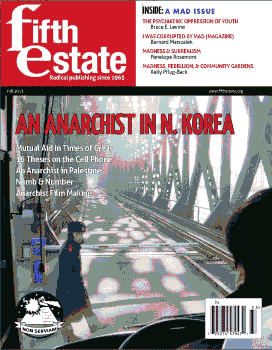Fifth Estate 390, Fall, 2013 Add to the Bookbuilder

Various Authors
Letters to the Editor
Our readers respond
Send letters to fe — AT — fifthestate — DOT — org or Fifth Estate, POB 201016, Ferndale MI 48220.
All formats accepted including typescript & handwritten; letters may be edited for length.
What Size?
Not many mistakes in your Summer 2013 edition, but one I saw that referred to the 7-1/2” penis. It shrank significantly from the headline measurement of “Lessons from a 7-Foot Penis.”
Dec 12, 2013 Read the whole text...
Fifth Estate Collective
Contents of print edition
#390, Fall, 2013, Vol. 48, No. 2
Cover photo: Pierre Garine: Bridge across the Yalu River to N. Korea
4 Mutual Aid in Times of Crisis scott crow
6 Mutual Aid in Action Dr. Zak Flash
8 16 Theses on the Cell Phone Jason Rodgers
9 “You are not welcome in New Zealand. Mr. Rovics.” David Rovics
10 Grand Jury Resister Margaret Killjoy
Dec 12, 2013 Read the whole text...
Fifth Estate Collective
This is not the Fifth Estate...
...that is the new movie drama about Wikileaks and Julian Assange.

Nov 9, 2013 Read the whole text...
scott crow
Mutual Aid in Times of Crisis: Ecological, Economic, and Political
On the ground, doing what is needed

The mutual-aid tendency in man has so remote an origin, and is so deeply interwoven with all the past evolution of the human race, that it has been maintained by mankind up to the present time, notwithstanding all vicissitudes of history.
-- Peter Kropotkin, Mutual Aid
Nov 8, 2013 Read the whole text...
Dr. Zakk Flash
Solidarity Is Our Strength
Mutual Aid in Action in Oklahoma Tornado
The 2013 Moore tornado was an EF5 velocity storm that struck Moore, Oklahoma, and adjacent areas on the afternoon of May 20, 2013, with peak winds estimated at 210 miles per hour, killing 23 people and injuring 377 others.
At the beginning of June, when I arrived in Little Axe, Okla. to take a look at post-tornado recovery efforts, the countryside was still in crisis mode. Mountains of rubble and garbage filled gravel roads and red dirt paths leading to the remains of homes. Neighborhoods that had been full of working-class houses were uprooted and dirty, unsafe tent camps were all that remained.
Nov 26, 2013 Read the whole text...
Jason Rodgers
Against the Poverty of Language and Thought
16 Theses on the Cell Phone
-
Cell phones are an overpowering, ever present factor in society. A factor which has multiplied at a staggering rate.
-
They help to deal with the fear of the unknown. It is imagined that they provide for the protection of children, assuring that the child will never be stranded or outside of the watchful parental gaze. If a car breaks down, one no longer needs to risk getting a ride from a stranger--a risk which is primarily having to confront the overwhelming alienation of our community.
-
The cell phone allows the user to avoid the risk of missing the updates they are constantly bombarded with. It is simpler and more convenient than having to risk making mundane choices yourself. The user is never difficult to contact about anything, no matter how banal.
-
The cell phone fulfills the need to be hip and current. Those without mobile communications devices are constructed as being outdated, in the cultural lag, backwards. By owning a cell phone one can feel progressive and up to date.
-
The underlying motivations for cell phone ownership are fear and convenience. Ultimately fear avoidance and convenience are the same thing- the avoidance of ambiguous situations.
-
It is no extreme statement to say that capitalism creates false needs. Fifteen years ago cell phones were a rarity, certainly no necessity. How did we live before? They are now a need. We need it like a fix of cellular smack.
-
The cell sell is the easiest imaginable; the consumer does it themselves. After the initial convincing, the consumer signs a contract, which they suffer monetary penalties for breaking. Once trapped, the job of persuasion is internalized by the consumer, so as to not face their contractual trap.
-
It is now standard at many jobs, even low paying ones, to expect ownership of a mobile phone. Employers can constantly contact employees. Labor engulfs everyday life.
-
Due to the addition of text messaging the cellular communication is trapped between orality and literacy. It has neither the improvisation and open ended nature of spoken language, nor the complexity and depth of written language.
-
This contributes to a poverty of language. The exchange is constant, yet nearly meaningless. This poverty of language contributes to a poverty of thought.
-
The 911 system, required by law to be included on all cell phones, allows the location of any cell phone to be triangulated, via GPS, within a few yards. The communication device becomes a tracking device. The cell is a cell.
-
Paranoid? Maybe. After all, they can’t be tracking everybody all the time; there are just too many people. Precisely the point. The 911 system fulfills the concept of the Panopticon analyzed by Michel Foucault. We know they can’t be paying attention to everyone at every given moment. At the same time we know that they have the capability for surveillance on anyone at any given time.
-
This position causes the internalization of the control of surveillance. The oppressor is no longer a clear external force, it is now a formless totality which impersonally constrain us. This formlessness makes it difficult to remain autonomous against it; it can not be pinned down. Furthermore, the user knows that they consented.
-
Cellular technology is transforming man into a cyborg. The technology grows more ever present. The user becomes more and more integrated into the totality. McLuhan argued that the integrated circuit and the television were extensions of the nervous system. He seems to have been premature. The cell phone is closer to the realization of this extension of the neurological system. Remember, McLuhan’s often forgotten companion point, every extension is also an amputation.
-
The cell phone is becoming a permanent extension. It is responded to nearly automatically. This interaction forms a feedback system; a cybernetic system. What thoughts are ours, in this cybernetic system? This cybernetic transformation is particularly noticeable in the case of ear pieces and other hands free devices.
-
The question this brings up is not one of right and wrong. It is a matter of admitting that these devices cause major shifts and determining if these shifts are what we actually want. It has been pointed out to me that the picture I present may even be too optimistic.
Dec 12, 2013 Read the whole text...
David Rovics
“You are not welcome in New Zealand, Mr. Rovics.”
Or, the 207th reason why to hate all nation states
It was mid-August, and after singing at various events, mainly ones commemorating the bombing of Hiroshima, I was supposed to be switching planes, en route from Fukuoka to Christchurch, New Zealand, via Tokyo and Auckland. When I got paged over the intercom to the All Nippon Airways desk I was nervous, but figured it was something about a seat assignment on the flight from Narita to Auckland that I was about to board. When the woman from ANA handed me a cell phone and said that someone from New Zealand Immigration in Auckland wanted to talk to me, I was suddenly feeling fatalistic.
Nov 18, 2013 Read the whole text...
Margaret Killjoy
We Will Not Be Broken
Jerry Koch, Grand Jury Resister

We packed the courtroom to overflowing, some of our number forced to wait nervously in the hall outside. Jerry Koch, a New York City anarchist and legal activist, stood calmly and silently as his lawyer went through the motions of arguing against his incarceration and the judge yelled at her.
Nov 13, 2013 Read the whole text...
Saint Just
Shutdown
Policing the Crisis in Pittsburgh and Boston

I have had the unfortunate privilege of experiencing two urban shutdowns in the U.S. In 2009, while living in a quickly gentrifying neighborhood adjacent to the University of Pittsburgh as a graduate student, I experienced a preemptive shutdown of a major city during the G-20 summit meeting of the finance ministers of the top world economies.
Nov 26, 2013 Read the whole text...
Taylor Weech
An Anarchist in Palestine
Militarism and Madness

Growing up in the post-9/11 U.S., I’ve experienced the psychological discord of this culture and witnessed the expansion of its violent global footprint. This June, I traveled to Israel for two weeks with Interfaith Peace-Builders hoping to broaden my understanding of conflict and nationalism.
Dec 14, 2013 Read the whole text...
Pierre Garine
An Anarchist in North Korea
The Opposite of Freedom: A Journey to Pyongyang

The Democratic Peoples Republic of Korea (DPRK)--North Korea. The very mention of the country’s name and a blizzard of buzzwords are released: Cult of Personality, Mass starvation, Nuclear-armed, Thought Control, Defectors and Reverse-defectors.
A land completely closed to the outside world? Since the 1960s, a small but steady stream of foreign delegations, diplomats, NGO representatives, and regular tourists have been permitted to visit North Korea, albeit under tightly controlled conditions with official minders watching every move and word.
Dec 14, 2013 Read the whole text...
Fifth Estate Collective
Call for Submissions, Spring, 2014
Deadline: January 15
Publication date: February 15
Issue Theme: Anarchy, Anarchism & Anarchists.
We welcome your ideas for news articles, essays, and art. Submit manuscripts for short pieces and proposals for longer essays, along with graphics and photographs to:
fe--AT--fifthestate--DOT--org
Dec 14, 2013 Read the whole text...
Rachael Stoeve
“I Got Raped By That Pizza”
Language & the Trivialization of Gender-Based Violence
Throughout history, atrocities other than sexual assault have been described as rape. One example of this is the World War II Japanese massacre known as the Rape of Nanking. This serves the rhetorical purpose of bringing home the horrible nature of a crime, since rape itself is so horrifying.
Recently, however, there has been a trend towards trivializing it in common slang, assisted by its use as a descriptive for incidences completely unrelated to sexual assault. This obscures the meaning and nature of rape.
Dec 14, 2013 Read the whole text...
Leslie James Pickering
How one activist discovered his mail was being watched
Even in the modern surveillance state, the cops still use the old methods

Burning Books opened in Buffalo, New York on September 9, 2011, the 40th anniversary of the Attica Prison uprising. The store, located on the city’s west side is a family-run, friendly, neighborhood radical bookstore, owned by me, Theresa Baker-Pickering, and Nate Buckley. It has quickly become an activist hub for the local community.
Dec 14, 2013 Read the whole text...
anon.
To Be Governed
Government Spying Didn’t Begin With the NSA
The old fashioned mail surveillance described on the opposite page is surprising since now most government snooping is done by modern technology. Apparently, however, the old-fashioned, J. Edgar Hoover-type is still around, although it too is being replaced by technology.

It’s recently been exposed that every piece of U.S. mail which goes through the postal system is scanned and its exterior digitally retained just like the NSA files.
Dec 14, 2013 Read the whole text...
Fifth Estate Collective
Green Scare Prisoner remains in Worst Fed Prison
Campaigners in high gear to Move Marie Mason!
An international campaign demanding that imprisoned environmental activist, Marie Mason, be transferred from the repressive, high-security Carswell federal prison at Fort Worth, Texas, to a minimum security unit close to her family and friends, is in high gear.
Actions include a world-wide letter writing effort addressed to the U.S. federal Bureau of Prisons, legal action, and increased distribution of information about her case.
Dec 14, 2013 Read the whole text...
John Zerzan
Numb and Number
The digital age is pre-eminently the ultimate reign of Number. The time of Big Data, computers (e.g. China’s, world’s fastest) that can process 30 quadrillion transactions per second, algorithms that increasingly predict--and control--what happens in society. Standardized testing is another example of the reductive disease of quantification.
Number surpasses all other ideas for its combination of impact and implication. Counting means imposing a definition and a control, assigning a number value. It is the foundation for a world in which whatever can be domesticated and controlled can also be commodified. Number is the key to mastery: everything must be measured, quantified. It is not what we can do with number, but what it does to us. Like technology, its intimate ally, number is anything but neutral. It tries to make us forget that there is so much that shouldn’t or can’t be measured.
Dec 15, 2013 Read the whole text...
Bruce E. Levine
Psychiatry’s Oppression of Young Anarchists
— and the Underground Resistance
Many young people diagnosed with mental disorders are essentially anarchists with the bad luck of being misidentified by mental health professionals who: (1) are ignorant of the social philosophy of anarchism, (2) embrace, often without political consciousness, its opposite ideology of hierarchism, and (3) confuse the signs of anarchism with symptoms of mental illness.
Dec 15, 2013 Read the whole text...
Bernard Marszalek
I was corrupted by MAD (magazine)
MAD, the wildly satirical humor magazine, was my primer for critical thinking in my early teens. This may seem an odd statement given the vacuous contents of the current magazine, but today’s MAD is a pale reflection of its initial 1950s issues. We could say that it has been “neo-liberalized” like all mainstream media.
Dec 15, 2013 Read the whole text...
Kelly Pflug-Back
Madness, Rebellion, and Community Gardens
a review of
Maps to the Other Side: The Adventures of a Bipolar Cartographer, Sascha Altman DuBrul, 2013, Microcosm Publishing, 189 pp., $15.95, microcosmpublishing.com
“The deeper that sorrow carves into your being, the more joy you can contain...” once wrote the renowned Lebanese poet Kahlil Gibran. “Verily you are suspended like scales between your sorrow and your joy. Only when you are empty are you at standstill and balanced.” While the term “bipolar” had not yet been introduced into the world of psychiatry when Gibran wrote these words in 1923, the sentiment is strikingly similar to that found in the eclectic mixture of essays, interviews, eulogies for deceased friends, and self-reflective ramblings which compose Sascha Altman DuBrul’s latest book, Maps to the Other Side. This slim volume is part punk memoir, part how-to manual for guerrilla gardening, and part rallying cry for a revolution in terms of our cultural perceptions of and reactions to mental health.
Dec 15, 2013 Read the whole text...
Peter Werbe
M.A.D.
Mutually Assured Destruction
It’s hard to pinpoint exactly when societies began to exhibit mass madness, but it certainly happened as the political state arose some scant four thousand years ago. What delusions of grandeur must have inhabited the mind of the first man to stand atop a ziggurat and announce that he was the representative of the gods on earth, or, crazier, that he was a god manifest with the right to rule over his subjects.
Dec 15, 2013 Read the whole text...
Richard Gilman-Opalsky
The Reasonable “Madness” Of Revolt
Isn’t it crazier to submit?

In the existing world, largely governed by the logic of capital and the pathologies of accumulation, real madness is the absence of revolt.
Wherever revolt is absent in the world today, we should worry about human health and sanity. A society that does not revolt against a social order that damages it with such escalating facility--psychologically, collectively, ecologically--is a society at the terminal stage.
Dec 17, 2013 Read the whole text...
Alex Knight
Who Were the Witches?
Patriarchal Terror & the Creation of Capitalism
a review of
Caliban and the Witch: Women, the Body, and Primitive Accumulation, Silvia Federici, Autonomedia 2004, 288pp, $14.95, autonomedia.org/caliban
Silvia Federici’s book is an essential read for those of us seeking to overthrow systems of domination and to build a liberated future. What is most fascinating about Caliban and the Witch is how it challenges the widely-held belief that capitalism, though perhaps flawed in its current form, was at one time a “progressive” or necessary development.
Dec 17, 2013 Read the whole text...
Penelope Rosemont
Influencing Machines...
..., Intuition Pumps, Paranoia & The Poisonous Cobra of Surrealism
Madness & the Surrealist Imagination
The common denominator of the sorcerer, the poet and the madman cannot be anything but magic...the flesh and blood of poetry.
--Benjamin Peret
Surrealists have celebrated madness as a means of exploring the possibilities of the human mind. Madness provides that window into how people put together reality; how thoughts are often assembled in an unusual and creative way.
Dec 17, 2013 Read the whole text...
Quincy B. Thorn
Tales from the Cybersphere: FE on the Web
A guide to the Web presence of Fifth Estate staff, writers, and friends

Besides contributing to this publication, three longtime Fifth Estate regulars have also had a part in shaping Detroit’s 1980s radical music scene.
Alan Franklin, Ralph Franklin and Stephen Goodfellow, in addition to writing articles and creating graphics for the magazine, played key roles in the Layabouts, a band that, since its founding in the early 1980s, has taken its inspiration from the best in both radical music and anarchist politics. Musically, the group describes itself as “creating a sound that blends rock, ska, reggae, Latin and African rhythms.”
Dec 18, 2013 Read the whole text...
Franklin López
Making Anarchist Films
Mutual Aid Helps the Process
In the aftermath of 9/11, I pretty much dropped everything to produce media about the protests against the war in Afghanistan. However, I was clueless about the alter-globalization movement and that mass mobilizations had been happening all over the world for the two years preceding the Twin Towers attacks.
Dec 18, 2013 Read the whole text...
Fifth Estate Collective
Five Ways to Help the Fifth Estate
-
Subscribe. Subscribers are a publication’s life blood. If you bought this at a news stand, consider subscribing and buying one for a friend or a library.
-
Donate. Postal and printing costs continue to rise, making financial stability an increasing challenge to publications which refuse commercial advertising. Donations also allow us to continue sending free subscriptions to prisoners and GIs.
-
Distribute the FE. Sell or give away current or back issues. Get stores in your area to sell the magazine. Use them for tabling. Take them to events and demos. Bulk back issues are available for the cost of postage. Write us at fe@fifthestate.org for info.
-
Hold a fundraiser for the FE. A house party or an event not only provides revenue for the magazine, but gets people together that share similar ideas.
-
Become an FE Sustainer. Sustainers pledge a certain amount each issue or yearly above the subscription fee to assure our continuing publishing, and receive each issue by First Class mail.
Dec 18, 2013 Read the whole text...
Fifth Estate Collective
Montreal’s 9th International Anarchist Theatre Festival
Call-Out for Proposals
The Montreal International Anarchist Theatre Festival (MIATF), the only theatre festival in the world dedicated to showcasing anarchist theatre, is currently seeking submissions to be staged during May and June 2014. Application deadline for the Montreal International Anarchist Theatre Festival: January 31, 2014.
Dec 18, 2013 Read the whole text...
Peter Werbe
Fran Shor
Dave Sands
Julie Herrada
Mike Sabbagh
David Watson
An Anarcho-Crossword Puzzle
to test your knowledge of anarchist history and culture
View or download PDF [57 KB] fe-390-48-anarcho-crosswordHints are displayed below the puzzle.
See below for answers and annotationshttp://www.fifthestate.org/wp-content/uploads/2013/10/fe-390-48-anarcho-crossword.pdf

ACROSS
3. Brit anarcho-punk band; also rude or distasteful
5. Not charity; the Prince agrees 6,3
Oct 7, 2013 Read the whole text...
Fifth Estate Collective
Answers and Annotations to Anarcho-Crossword

Voltairine: Voltairine de Cleyre (1866--1912); prolific anarchist-feminist writer and lecturer who advocated freethinking and “anarchism without adjectives.”
Nov 22, 2013 Read the whole text...
